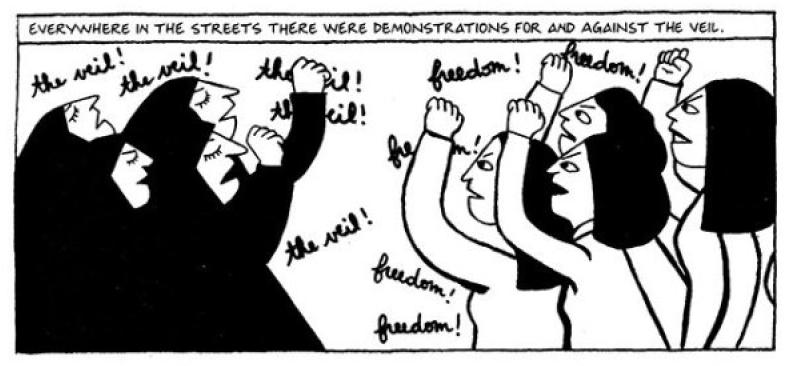 |
Craig White's Literature Courses Colonialism & Postcolonialism |
 thanks to https://blogs.stockton.edu/postcolonialstudies/veils-and-postcolonial-feminism/ |
Postcolonial Studies potentially extend to any and all empires in human history, e.g. the Ottoman, Roman, Mughal, Chinese, Mayan empires.
Practically, however, postcolonial studies are dominated by the most recent wave of empires—the European Empires—and the colonial and postcolonial cultures they generated.
![]()
Three (+) waves or stages to modern (European) colonialism and postcolonialism:
1. European colonial period: 1500s to mid-1900s
2. Independence movements: mid-to-late 1900s
3. Neo-Colonialism / Transnational Migration (globally mobile capital and labor): immigrants from formerly colonized nations in the developing world immigrate to formerly colonizing nations of developed world
4. Fourth wave? Immigrants from developing world return to nations of origin as they become developed and capitalized. ("Passage from India" article regarding potential 4th wave of colonialism / immigration)
![]()
Independence movements partly rose from developments surrounding the two World Wars of the early 20th century, in which European nations (and Japan) attempted to extend their empires but succeeded more in weakening each other.
Meanwhile, colonial peoples exploited this weakness by developing national movements, either in league with or opposition to the imperial powers. In the process, colonized peoples and anti-colonial movements often became aware of each other and the emerging global struggle for independent states, and often learning from each other's histories and organizations.
World War 1: 1914-1918
World War 2: 1939-45
Major Events following WW2
1. Establishment of Israel in Palestine (1948)--> End-Time Prophecies esp. in USA
2. Partition / Independence of India, Pakistan (1947)
3. Indochinese anti-colonial or national movements in resistance to France and USA
4. African and Afro-Caribbean nations gain independence 1950s-60s
5. 1997: sovereignty of Hong Kong transferred from Great Britain to People's Republic of China after 156 years of British colonial administration.
![]()
Emory University: introduction to Postcolonialism
Stanford Encyclopedia of Philosophy: http://plato.stanford.edu/entries/colonialism/: Post-colonial Theory: . . . contemporary literary theorists have drawn attention to practices of representation that reproduce a logic of subordination that endures even after former colonies gain independence.
The field of postcolonial studies was influenced by Edward Said's path-breaking book Orientalism. In Orientalism Said applied Michel Foucault's technique of discourse analysis to the production of knowledge about the Middle East.
The term orientalism described a structured set of concepts, assumptions, and discursive practices that were used to produce, interpret, and evaluate knowledge about non-European peoples. Said's analysis made it possible for scholars to deconstruct literary and historical texts in order to understand how they reflected and reinforced the imperialist project.
Unlike previous studies that focused on the economic or political logics of colonialism, Said drew attention to the relationship between knowledge and power. By foregrounding the cultural and epistemological work of imperialism, Said was able to undermine the ideological assumption of value-free knowledge and show that “knowing the Orient” was part of the project of dominating it. . . .
![]()